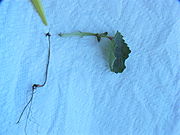
Damping off
Encyclopedia

Fungus
A fungus is a member of a large group of eukaryotic organisms that includes microorganisms such as yeasts and molds , as well as the more familiar mushrooms. These organisms are classified as a kingdom, Fungi, which is separate from plants, animals, and bacteria...
-caused ailments that can kill seeds or seedlings before or after they germinate.
The term is used most often in horticulture
Horticulture
Horticulture is the industry and science of plant cultivation including the process of preparing soil for the planting of seeds, tubers, or cuttings. Horticulturists work and conduct research in the disciplines of plant propagation and cultivation, crop production, plant breeding and genetic...
, where seeds are specifically planted to be germinated, especially if in warm, wet conditions which speed growth but are considered conducive to fungal attacks.
Symptoms
A given seed can become infected with a fungus, often causing it to darken and soften. This can kill it before the seedling emerges, or cause the seedling to be weak, sometimes getting "wet" patches on it which decay until it falls apart.Likewise, a seedling can be infected after it sprouts, before it leaves the ground, or even after it appears well-developed, the latter often resulting in the plant mysteriously thinning right where it touches the ground, until its stem at that point rots and it falls over.
Causes
A number of different fungi cause these problems, including:- BotrytisBotryotiniaBotryotinia is a genus of ascomycete fungi causing several plant diseases. The anamorphs of Botryotinia are mostly included in the imperfect fungi genus Botrytis...
, also known as "grey mould". - Macrophomina phaseoli
- PhytophthoraPhytophthoraPhytophthora is a genus of plant-damaging Oomycetes , whose member species are capable of causing enormous economic losses on crops worldwide, as well as environmental damage in natural ecosystems. The genus was first described by Heinrich Anton de Bary in 1875...
- PythiumPythiumPythium is a genus of parasitic oomycete. Most species are plant parasites, but Pythium insidiosum is an important pathogen of animals...
- Rhizoctonia solaniRhizoctonia solaniRhizoctonia solani is a plant pathogenic fungus with a wide host range and worldwide distribution. This plant pathogen was discovered more than 100 years ago. Rhizoctonia solani frequently exists as thread-like growth on plants or in culture. Asexual spores are not produced, only the sexual stage...
- Sclerotium rolfsii
- ThielaviopsisThielaviopsisThielaviopsis is a small genus of fungi in the order Microascales. The genus includes several important agricultural pathogens. The most widespread is T. basicola, the causal agent in several root rot diseases of economically important crop species including cotton and a variety of vegetables...
Prevention
Damping off can be prevented in many different ways, including germination in drier conditions with better air circulation (but this slows germination), starting seedlings in sterilized soil, and/or spraying the soil with an anti-fungal known to work for this purpose, either a commercial one or a homemade solution, such as one made from chamomile tea or garlicGarlic
Allium sativum, commonly known as garlic, is a species in the onion genus, Allium. Its close relatives include the onion, shallot, leek, chive, and rakkyo. Dating back over 6,000 years, garlic is native to central Asia, and has long been a staple in the Mediterranean region, as well as a frequent...
.

